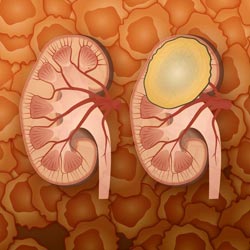Cancer stem cells isolated from kidney tumours

Right-hand side: Kidney with Wilms' Tumour<br>Uta Mackensen, EMBO<br>
The researchers have used these cancer stem cells to test a new therapeutic approach that one day might be used to treat some of the more aggressive types of this disease. The results are published online in EMBO Molecular Medicine.
“In earlier studies, cancer stem cells were isolated from adult cancers of the breast, pancreas and brain but so far much less is known about stem cells in paediatric cancers,” remarked Professor Benjamin Dekel, head of the Pediatric Stem Cell Research Institute and a senior physician at the Sheba Medical Center and the Sackler School of Medicine at Tel Aviv University, Israel. “Cancer stem cells contain the complete genetic machinery necessary to start, sustain and propagate tumour growth and they are often referred to as cancer-initiating cells. As such, they not only represent a useful system to study cancer development but they also serve as a way to study new drug targets and potential treatments designed to stop the growth and spread of different types of cancer.” He added: “We have demonstrated for the first time the presence of cancer stem cells in a type of tumour that is often found in the kidneys of young children.”
Wilms’ tumours are the most prevalent type of tumour found in the kidneys of children. While many patients respond well if the tumours are removed early by surgery and if patients are given chemotherapy, recurrences may occur and the cancer can spread to other tissues increasing the risks to the health of the patient. Conventional chemotherapy is toxic to all cells in the body and if given to children may lead to the development of secondary cancers when they become adults. Scientists are looking for ways to ensure that drugs are targeted specifically to tumour cells and some cells in a tumour may be more important to eradicate than others.
The researchers were able to remove parts of the tumours of cancer patients and graft them into mice. This procedure led to the growth of human tumours in mice. Cancer stem cells were identified in these tumours and it was shown that only the cancer stem cells and not the other cancer cells led to the development of new tumours upon grafting into additional mice. This process could be repeated multiple times and the animals could be used to study the development of cancer and test the action of potential new cancer drugs against Wilms’ tumours.
“We identified several biomarkers, including molecules that are on the cell surface, cell signaling molecules and microRNAs, that make it possible to distinguish between cancer stem cells or cancer-initiating cells and the rest of the cells in the tumour that are less likely to lead to cancer. In further experiments, we were able to show that an antibody drug that targets one such biomarker, the neural cell adhesion molecule, was able to either almost completely or in some cases completely eradicate the tumours that we induced in mice,” added Dekel. “This preliminary result suggests that the cancer stem cells that we have identified, isolated and propagated may serve as a useful tool to look for new drug targets as well as new drugs for the treatment of Wilms’ tumours.”
Further work is needed to identify more precisely how the antibody drug used in the study (lorvotuzumabmertansine) affects cancer stem cell populations and to test the long-term suitability of the antibody drug to treat Wilms’ tumours in humans.
Prospective isolation and characterization of renal cancer stem cells from human Wilms’ tumor xenografts provides new therapeutic targets
Naomi Pode-Shakked, Rachel Shukrun, Michal Mark-Danieli, Peter Tsvetkov, Sarit Bahar, Sara Pri-Chen, Ronald S. Goldstein, Eithan Rom-Gross, Yoram Mor, Edward Fridman, Karen Meir, Marcus Magister, Naftali Kaminski, Amos Simon, Victor S. Goldmacher, Orit Harari-Steinberg, Benjamin Dekel
Read the paper:
http://onlinelibrary.wiley.com/doi/10.1002/emmm.201201516/full
doi: 10.1002/emmm.201201516
Further information on EMBO Molecular Medicine is available at www.embomolmed.org
Media Contacts
Barry Whyte
Head | Public Relations and Communications
Yvonne Kaul
Communications Offer
Tel: +49 6221 8891 108/111
communications@embo.org
About EMBO
EMBO is an organization of more than 1500 leading researchers that promotes excellence in the life sciences. The major goals of the organization are to support talented researchers at all stages of their careers, stimulate the exchange of scientific information, and help build a European research environment where scientists can achieve their best work.
EMBO helps young scientists to advance their research, promote their international reputations and ensure their mobility. Courses, workshops, conferences and scientific journals disseminate the latest research and offer training in techniques to maintain high standards of excellence in research practice. EMBO helps to shape science and research policy by seeking input and feedback from our community and by following closely the trends in science in Europe.
Media Contact
More Information:
http://www.embo.orgAll latest news from the category: Life Sciences and Chemistry
Articles and reports from the Life Sciences and chemistry area deal with applied and basic research into modern biology, chemistry and human medicine.
Valuable information can be found on a range of life sciences fields including bacteriology, biochemistry, bionics, bioinformatics, biophysics, biotechnology, genetics, geobotany, human biology, marine biology, microbiology, molecular biology, cellular biology, zoology, bioinorganic chemistry, microchemistry and environmental chemistry.
Newest articles

Solving the riddle of the sphingolipids in coronary artery disease
Weill Cornell Medicine investigators have uncovered a way to unleash in blood vessels the protective effects of a type of fat-related molecule known as a sphingolipid, suggesting a promising new…

Rocks with the oldest evidence yet of Earth’s magnetic field
The 3.7 billion-year-old rocks may extend the magnetic field’s age by 200 million years. Geologists at MIT and Oxford University have uncovered ancient rocks in Greenland that bear the oldest…

Decisive breakthrough for battery production
Storing and utilising energy with innovative sulphur-based cathodes. HU research team develops foundations for sustainable battery technology Electric vehicles and portable electronic devices such as laptops and mobile phones are…





















